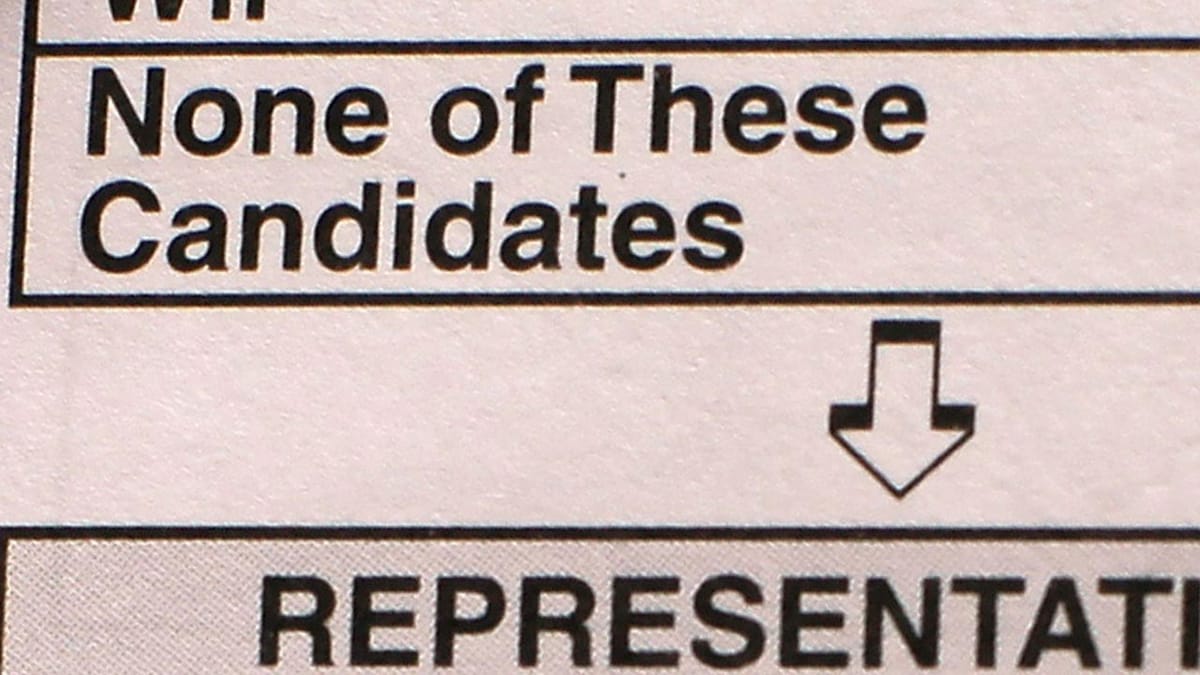|
Pres. Joe Biden has officially dropped out of the 2024 presidential race. In doing so, he's thrown the Democratic party into a deep pit of uncertainty less than a month before the Democratic National Convention. But while Americans across the country are left in the dark about who will fill his spot on the ballot, we must first acknowledge that Democrats did this to themselves. Rather than asking, "who's the nominee?" we instead should be asking, "What about the way the Democratic party is run led us to such a dire situation?" Democrats Did This To ThemselvesLet's begin by reminding ourselves that Donald Trump is not a popular presidential candidate. While his supporters may be loud and enthusiastic, a clear majority of Americans are not excited to see his name on the presidential ballot for a third time. He's backed by a Republican party that's been trending toward unpopular, extremist ideology. Their playbook for Trump's second administration, Project 2025, continues to gain more opponents than supporters. Less than a third of voters believe that Trump's vice presidential pick, JD Vance, was a "good choice" of a running mate. In a nutshell, most data points very clearly point to the fact that today's Republican party should not be winning national elections. Yet Democrats chose to support a candidate that is just as unpopular as their opponent. As president, Joe Biden has had a negative net approval rating since September 2021 and that disapproval has only grown since he launched his re-election campaign. Meanwhile voters have been clear that they approve of the Democratic agenda, just not the person at the helm of the party leading said agenda. Leaders of the Democratic party have known about Biden's weaknesses for more than a year and instead of searching for a better candidate, they deliberately crafted a primary process that would shield the president from addressing his weaknesses. An Undemocratic Primary"[The president] has declared a re-election campaign. In that case, the Democratic National Committee will not facilitate a primary process [in 2024]. There will be no debate stage for Robert Kennedy or Marianne Williamson or anybody else... There will be no debating. The DNC administers the debates and they're not gonna set-up a primary process for debates for someone to challenge the head of the Democratic Party."
-Symone Sanders, Former Senior Advisor and Chief Spokesperson to the Vice President
The quote above was shared live on an MSNBC morning show back in May 2023, a full eight months before the earliest primaries were to be held. While Sanders did not serve in an official capacity on the DNC for the 2024 election cycle, her assessment of the party's approach was as if she read the official playbook. After an incredibly crowded field of potential candidates emerged in the 2020 primary, somehow none of them felt the urge to try again at the next available opportunity. Only a retiring House Democrat opted to take on the sitting president and he didn't even make it on the primary ballot in most states. Many within the party have tried to silence dissent by claiming that replacing Biden as the nominee would be an "undemocratic" exercise, subverting the will of the millions who voted in the primary. But that glosses over the fact that the party held an undemocratic primary by depriving Democratic voters of choice. Remember: voters in only 25 states had the option of voting "uncommitted" to voice their displeasure with Biden and Florida and Delaware voters literally didn't have the opportunity to participate in a primary at all. Undemocratic presidential primaries have emerged as an unfortunate trend for the Democratic party in recent years. The handicapping for Hillary in 2016 has been heavily documented as one of the many openings Democrats provided for Trump to win the presidency. And while the 2020 primary allowed for a much more competitive contest in the early days, most seem to forget that Biden lost the first three early-state primaries to Bernie Sanders in 2020. If Sanders was more embedded within the Democratic establishment, he might be our president today. But because Sanders stood as a challenger to the Democratic establishment, they fought back by coalescing behind the first non-Bernie candidate to win a contest while coercing other losers to do the same. Bringing it back to 2024, Biden's weaknesses would have been laid bare if the party allowed a competitive primary. But because they embraced moves that privileged the president, like moving Biden's 2020 savior state of South Carolina to the front of the primary calendar, they were able to make Biden's nomination seem like an inevitability rather than a liability. A Morally Bankrupt CampaignLet's be clear: Republicans have no ethical core to their party. The most consistent theme that connects the various ideological corners on the right is "rules for thee, not for me." This can be seen in the way they demonize poor people for receiving welfare, yet their economic agenda relies heavily on corporate welfare. Or how Republicans breathlessly defend the Second Amendment while regularly banning guns at events where prominent members of the party are speaking. Over the past two decades, Democrats have defined themselves against the ethical hollowing of the GOP by aligning their party around consistent ethical values, a defense of democracy and an all around commitment to human decency. This has been etched into the party's legacy by Michelle Obama with her now infamous quote, "'When they go low, we go high." Bringing in this history is imperative in identifying why Biden's 2024 campaign has crashed and burned consistently with its messaging. College students across the country protested this past Spring because they believed the atrocities in Gaza, funded via their tax dollars, are a complete abandonment of ethics, democracy and common human decency. And when they voiced their dissent, the Biden administration re-cast their peaceful protests as "hate speech" and "anti-semitism" while continuing to fund the genocide perpetrated by the Israeli military. Voters have consistently voiced their struggles with inflation and the cost of living and yet the campaign has insisted that Biden "should be getting more credit." When political challengers voiced their displeasure with party rules that prevent truly democratic primary contests, the party shrugged it off with a simple 'them's the rules'. Biden's re-election campaign was built solely on the belief that Donald Trump is an existential threat to the country. So much so that they felt it was worth ignoring the horrors perpetrated by an apartheid state, chastising Americans for not praising the president enough, and embracing undemocratic party rules that enable their candidate to sidestep scrutiny. When you acknowledge the mismatch between Biden's 2024 campaign and the stated values of the Democratic party, his failure to move even base Democratic voters in his favor begins to make sense. But the larger issue here is that this horrific campaign doesn't just have implications for the 2024 election as Biden and his loyalists are prompting a deeper reckoning amongst young and non-White voters. What Comes After 2024? The problem with obsessing over who will be Trump's new Democratic challenger is that it prevents us from addressing the long-term damage Biden's 2024 campaign has done to the Democratic party. Young voters and non-White voters, the bedrock base of the Democratic party, have only been moving away from the party throughout the 2024 campaign. And as mentioned before, our displeasure isn't with the Democratic party's agenda and policies, but moreso with the way the party attempts (and fails) to achieve legislative wins. We've seen what the current leaders of the party are willing to abandon in their pursuit of beating Trump and we don't like what we see. If you're willing to ignore undemocratic norms in your own party, the economic struggles faced by most Americans, and a freaking genocide, what do you really stand for? Biden's failed campaign has caused many in the Democratic base to rethink the way they participate in party politics. The optimists of the group have abandoned the national party to instead focus on affecting change via their state and local Democratic parties. But a much larger group of pessimists are beginning to second guess the Democratic party altogether. While older voters will shake their heads and quickly say "well there's only two parties, where are you gonna go?!?!" they forget that young voters possess the creativity and imagination to create new avenues to affect political change. While the upcoming convention should be a time to address these wounds and reinvigorate the party, it's much more likely to devolve into a fervent grasp for power followed by persistent calls to unite behind the eventual nominee. Just as before, leaders are likely to sidestep the problems they've caused with Biden's failed campaign because "we have to remain focused on defeating Donald Trump." But how do you win future elections with a dysfunctional, disaffected party? The 2024 Republican National Convention showed that Republicans have a clear playbook for the future, a wide bench of personalities to push those ideas forward and a deep ideological commitment to turning our nightmares into a reality. Republicans are smartly playing the long game while Democrats are foolishly gambling the future of the party on the outcome of this single election. Meanwhile, Democratic voters are desperate for a clear vision for the future and can only "hold their nose and vote" for so long...
|





